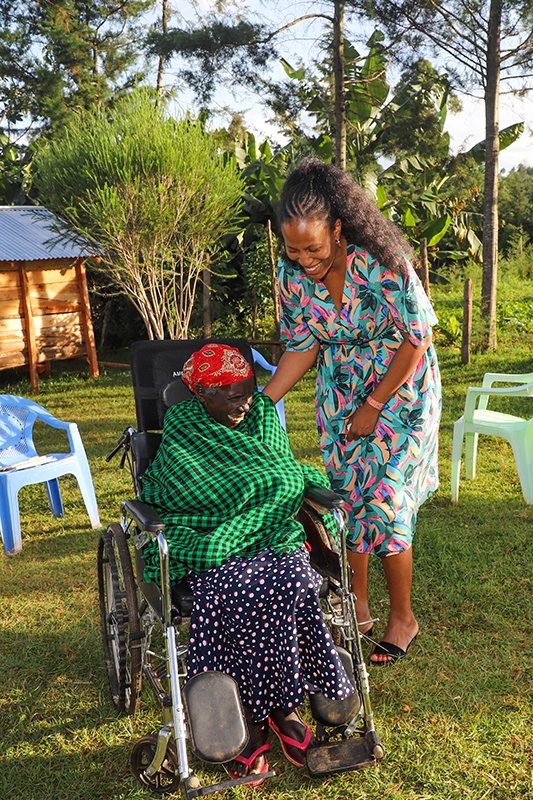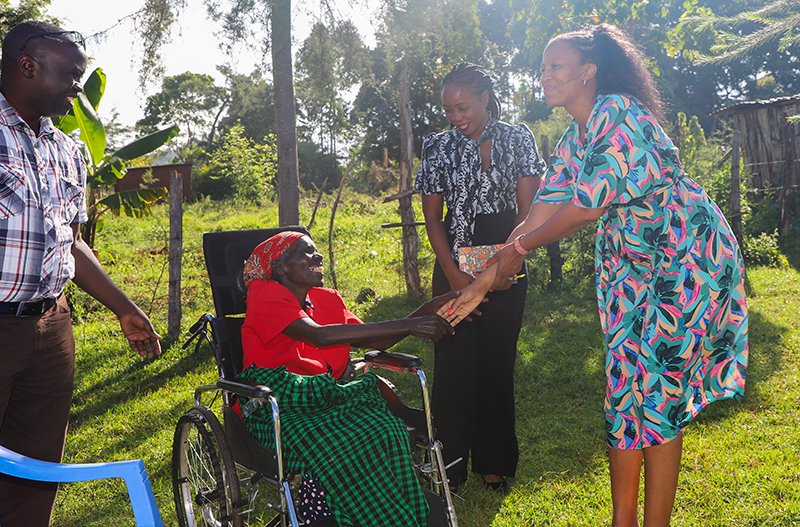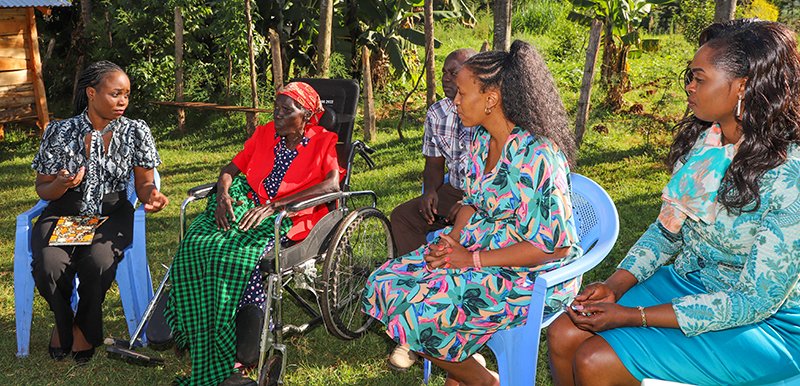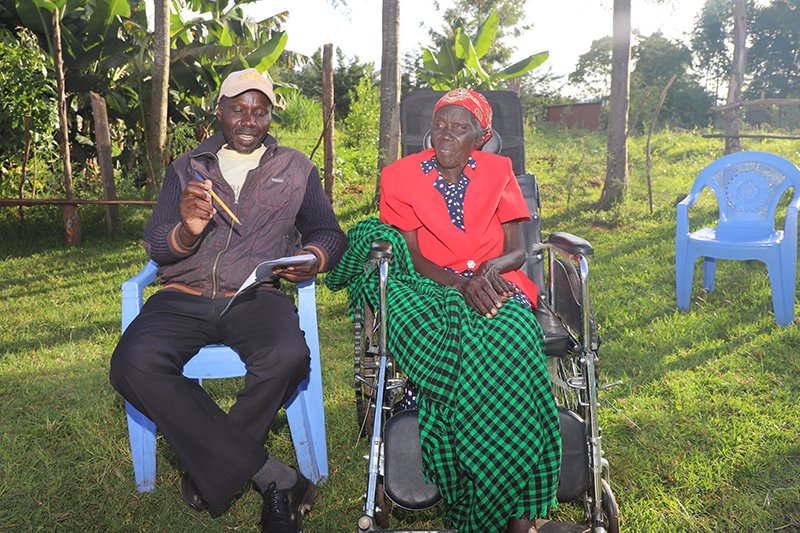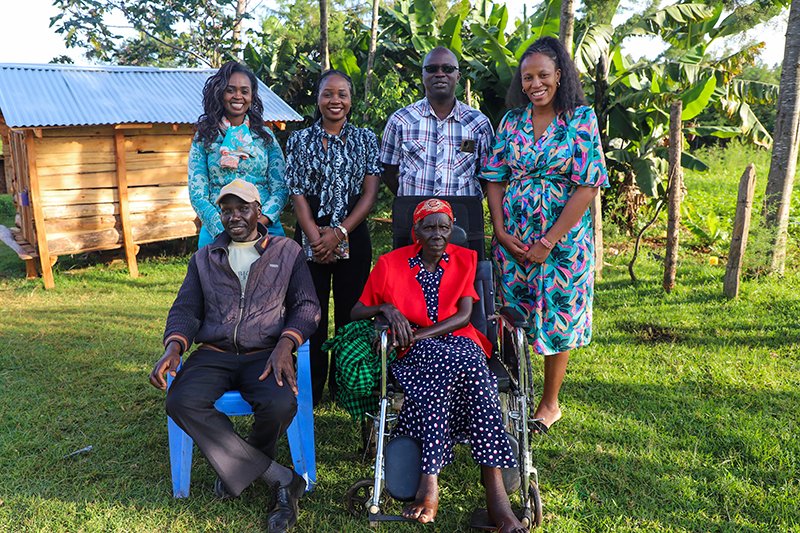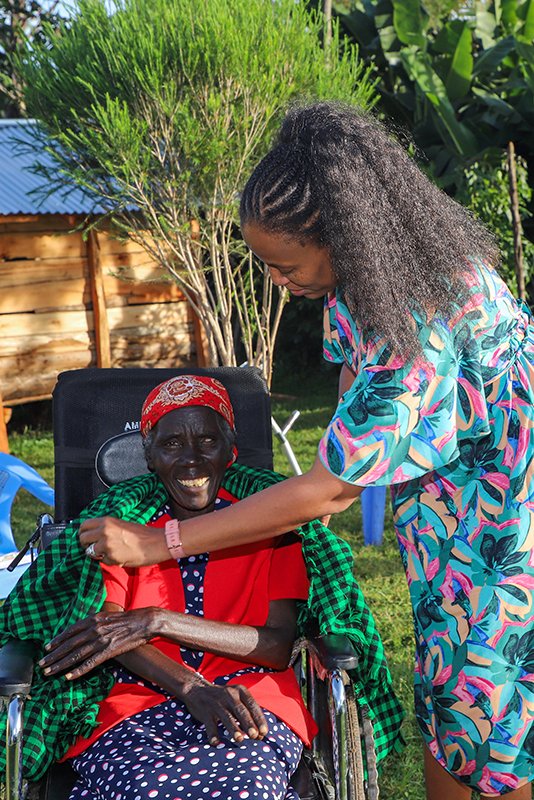Navigating the Unmet Needs of Multiple Myeloma in Kenya
For many patients living with multiple myeloma, financial and transportation challenges significantly affect their ability to seek care. Peris, a multiple myeloma warrior for the past 11 years, lives in a hard-to-access rural area. The feeder roads are terrible, and when it rains, it makes it even more difficult for her to get to the hospital.
The AMPATH Multiple Myeloma teamed welcomed Christabel Semondile (front right), BMSF Global Cancer Disparity Director
"I was diagnosed with multiple myeloma in June 2013 and got treatment until remission in 2015. However, after remission, I did not follow up on the appointment as prescribed, only to have a relapse two years later,” she said.
Multiple myeloma is a type of cancer that begins in plasma cells, white blood cells that are important to a healthy immune system. Over time, myeloma cells collect in the bone marrow, forming tumors in many of the body’s bones. These tumors may keep the bone marrow from making enough healthy blood cells and may weaken the bones. Some common symptoms include bone pain, weakness or fatigue, weight loss, frequent infections and frequent urination.
The AMPATH Multiple Myeloma Program endeavors to find, link, treat, and retain in-care patients such as Peris diagnosed with multiple myeloma. The program's primary goal is to ensure improved practice for early diagnosis, palliative care, and survivorship support for multiple myeloma patients and their caregivers. The program was established in 2012 through the support of Celgene Corporation. In 2020, collaboration with Bristol Myers Squibb Foundation (BMSF) was launched after BMS acquired Celgene.
Peris shared her journey during a recent site visit by the BMSF Global Cancer Disparity Director, Christabel Semondile. which echoes the challenges and experiences of many multiple myeloma patients.
"I am stuck to my wheelchair, which I thankfully got through the AMPATH program. While people walk or use motorcycles to get to the main road, my family must organize for a private car to get me to hospital. Many times, I could not afford it, and that is why I chose to default attending clinic until I became very sick."
In addition to the access challenges, the National Health Insurance Funds (NHIF) are often depleted before clients receive the recommended treatment. This forces the patients to disrupt treatment.
"For people who have their spouses, the program would encourage the use of the individual and spouse NHIF to be able to cover all costs of care. For me, my family had to sell our livestock to top up for me to get the needed care,” Peris added. Despite the many challenges, Peris is thankful that she is stronger and not in pain due to the care she has received from the AMPATH program.
Ms. Semondile also expressed her gratitude for the excellent work that AMPATH does through the BMSF funding saying, "The impact to the patient is exactly what the foundation seeks to do, and listening to stories like Peris' is what fires us to reach out more to those who enable this excellent work."
Myeloma Action Month is a global social awareness campaign every March to raise awareness of multiple myeloma. Worldwide, multiple myeloma accounts for almost 10% of blood cancers and is more common for Africans. Risk factors include advanced age, with a higher prevalence in men and those working in petroleum-related industries, as well as farmers due to specific agricultural exposures. The malignancy is referred to as silent blood cancer because it is difficult to diagnose and its presentations may be confused for other ailments.
The AMPATH Multiple Myeloma Program has, for the past decade, been responding to the unique needs of multiple myeloma patients by addressing the various needs including:
The team offers clinical care and follow-up including developing, initiating, and maintaining individualized treatment or management plans for myeloma patients. Since program inception, 499 myeloma patients have been enrolled into care, 44 patients are currently in remission. Over time there has been improved access to myeloma diagnostic and treatment services in public health facilities including Moi Teaching and Referral Hospital and other county health facilities. These efforts have improved survival outcomes and reduced treatment interruptions and delays.
The program also offers patient support and rehabilitation, psychosocial support, health insurance enrollment, transport, and laboratory investigations. AMPATH offers rehabilitation services, including mobility, orthopedic, occupational, physiotherapy, and palliative care services. Six hundred sixty-six patients have been supported to access laboratory tests for timely diagnosis and routine clinic follow-up; 303 patients have been supported with transport for routine clinic visits; and 122 myeloma patients have been supported to enroll with the National Health Insurance Fund (NHIF).
The program is also in the process of establishing a Kenya Multiple Myeloma Society for advocacy, psychosocial support, education and research.
In addition, the AMPATH Multiple Myeloma program offers training and awareness creation by targeting health care professionals and community health workers for prevention, screening, early detection, prompt diagnosis, and timely referral and treatment. To date, 3,692 healthcare providers and 1,009 community health extension workers have been educated about multiple myeloma.
Finally, there is the dissemination of information on multiple myeloma through research publications, conference presentations, and mass and social media platforms to guide policy around myeloma care and improve awareness of myeloma in the community.
Diagram of the services available from the AMPATH Multiple Myeloma program
AMPATH Multiple Myeloma Publications
Building a Sustainable Comprehensive Multiple Myeloma Program in Western Kenya
Multiple Myeloma Program Provides Care and Support
People of AMPATH: Multiple Myeloma Program
AMPATH Multiple Myeloma Program Adopts Telephone Counselling for Patient Care
Celgene AMPATH Oncology Partnership: Bristol-Myers Squibb Foundation


